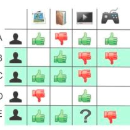Deep learning provides accurate collaborative filtering models to improve recommender system results. Deep matrix factorization and their related collaborative neural networks are the state-of-art in the field; nevertheless, both models lack the necessary stochasticity to create the robust, continuous, and structured latent spaces that variational autoencoders exhibit. On the other hand, data augmentation through variational autoencoder does not provide accurate results in the collaborative filtering field due to the high sparsity of recommender systems. Our proposed models apply the variational concept to inject stochasticity in the latent space of the deep architecture, introducing the variational technique in the neural collaborative filtering field. This method does not depend on the particular model used to generate the latent representation. In this way, this approach can be applied as a plugin to any current and future specific models. The proposed models have been tested using four representative open datasets, three different quality measures, and state-of-art baselines. The results show the superiority of the proposed approach in scenarios where the variational enrichment exceeds the injected noise effect. Additionally, a framework is provided to enable the reproducibility of the conducted experiments.
翻译:深层学习提供了精确的合作过滤模型,以改善推荐系统的结果。深层矩阵因子化及其相关的合作神经网络是该领域的先进技术;然而,两种模型都缺乏必要的随机性,无法创建动态自动自动校正展示的强大、连续和结构化的潜在空间。另一方面,由于推荐系统高度宽度,通过变式自动校对器进行的数据增强并不能提供协作过滤场的准确结果。我们提议的模型应用变式概念,在深层建筑的潜层中注入随机性,引入神经协作过滤场中的变异技术。这种方法并不取决于生成潜在代表的具体模型。这样,这种方法可以作为插件适用于任何当前和未来的特定模型。由于推荐系统具有四个代表性的开放数据集、三个不同的质量计量和最新基线,拟议模型已经进行了测试。结果显示,在变异浓缩超过注入噪声效果的情景中,拟议方法具有优越性。此外,还提供了一个框架,以便能够进行实验的再生能力。





